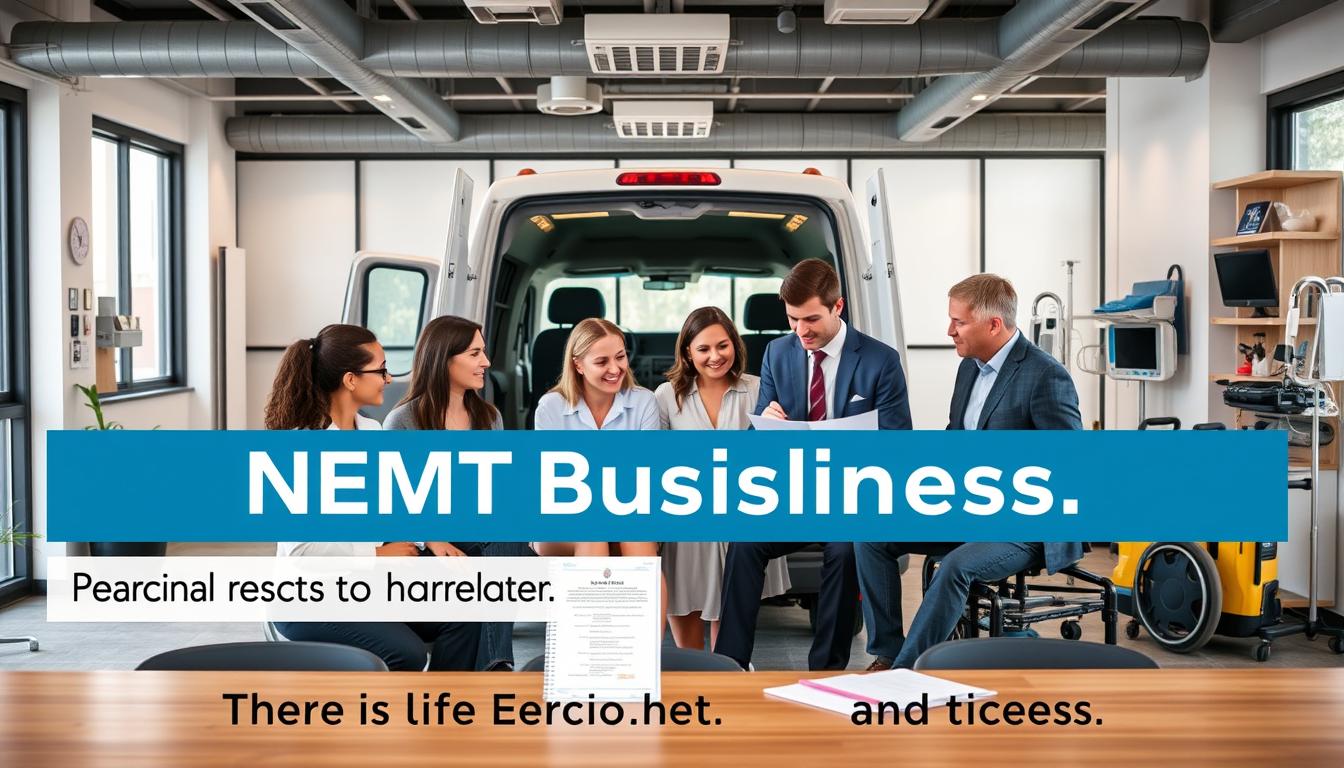Ever wondered what makes a NEMT business successful? It’s all about the operating agreements and service contracts. These documents are more than just outlines of roles and duties. They ensure your business runs smoothly and follows the law.
Without them, how can you show potential clients you’re ready? They’re key to building trust and a solid business plan.
In the fast-changing NEMT world, setting up your services needs careful planning and detailed contracts. This is crucial to avoid being rejected and to show you meet all the rules. Using technology like scheduling software and GPS is also essential.
Your operating agreements and service contracts are the legal backbone of your NEMT business. They cover everything from how you’ll measure success to following laws like HIPAA and ADA. As you start in this field, knowing these contracts is crucial for growth and reliability.
Key Takeaways
- Solid operating agreements and service contracts are essential for establishing NEMT services.
- Covering all mandatory elements in your proposal can prevent immediate disqualification.
- Technological utilization, like scheduling software and GPS tracking, is vital for operational efficiency.
- Compliance with regulatory standards such as HIPAA and ADA is crucial.
- Initial startup costs for NEMT businesses range from $30,000 to $100,000, with high profit margins due to constant demand.
Introduction to Operating Agreements and Service Contracts in NEMT
Non-Emergency Medical Transportation (NEMT) businesses rely on key legal documents. These documents are crucial for smooth operation and following rules. Knowing about NEMT operating agreements and NEMT service contracts is vital for success in this field.
Definition and Importance
NEMT operating agreements are the base of the business, outlining roles and rules. They show how decisions are made and profits are split. NEMT service contracts, on the other hand, explain the terms of service. They cover what’s expected, client duties, and legal rules, ensuring everyone is clear and protected.
Role in Business Foundation
Having good NEMT operating agreements and NEMT service contracts is key for a strong business. They set up a clear plan for managing and working well. This is important because more people need medical transport.
Having a solid business legal structure helps follow rules and keep clients’ trust. It makes operations clear and systematic.
Understanding NEMT Operating Agreements
Non-Emergency Medical Transportation (NEMT) operating agreements are key for smooth business operations. They also help keep your business in line with the law. Knowing these agreements well helps NEMT business owners meet their legal duties with confidence.
Key Components
For NEMT businesses, operating agreements need to cover a few important points:
- Business Purpose: Clearly outline the objectives and services provided.
- Membership Details: Define the roles and responsibilities of each member.
- Management Structure: Specify whether the business is member-managed or manager-managed.
- Financial Distributions: Detail how profits and losses will be shared among members.
Legal Requirements
Following NEMT legal compliance is key for getting the right licenses and permits. Legal needs can change by state but often include:
| Requirement | Description |
|---|---|
| HIPAA Compliance | Ensuring patient data protection and privacy. |
| NEMT Insurance | Mandatory coverage including general and professional liability. |
| Vehicle Standards | Ensuring vehicles are wheelchair-accessible with necessary features. |
| Driver Requirements | Valid licensing, background checks, and experience in assisting vulnerable populations. |
Knowing these agreement parts and legal needs keeps your NEMT business in line. It lets you keep serving clients well, meeting all legal duties. This makes your service safe and reliable.
The Role of Service Contracts in NEMT Businesses
Service contracts are key for non-emergency medical transportation (NEMT) businesses. They set out what’s expected, what’s allowed, and what’s not. These agreements help keep things running smoothly and ensure everyone knows their role.
As the NEMT industry grows, having strong service agreements is more important than ever. They help meet the rising demand and keep the quality of service high.
Types of Service Contracts
There are many types of NEMT contracts. They can be customized to fit different transportation needs:
- General Service Agreements: These cover basic transportation needs, with general terms and conditions.
- Wheelchair-Accessible Vehicle Contracts: These are for services that need wheelchair transport. They ensure vehicles and staff meet safety and accessibility standards.
- Non-Emergency Ambulance Contracts: These are for clients who need medical attention during transport. They include detailed medical and compliance requirements.
Critical Clauses to Include
When making contracts, it’s important to include key clauses. These protect both the company and the clients:
- Pricing Structure: This clearly states the costs, including per-ride rates and extra fees for things like mileage or special needs services.
- Scope of Services: This defines what services are offered and what’s not. It makes sure clients know what to expect.
- Liability and Insurance: This part covers insurance for vehicles and operations. It protects the company and its clients from potential risks.
- Compliance with Healthcare Standards: This ensures the service follows health and safety guidelines. It keeps the service agreement standards high and in line with healthcare rules.
Crafting Comprehensive NEMT Operating Agreements
Creating detailed NEMT agreements is key for a smooth NEMT business. These agreements need to cover essential business elements like ownership, management, profit sharing, and how to solve disputes. These parts help manage daily tasks and improve how your business works.
Essential Elements
When making an NEMT operating agreement, include these important parts:
- Ownership Details: Clearly state who owns the business and how much each owns.
- Management Responsibilities: Define what each owner and manager does to avoid confusion.
- Profit Sharing: Set rules for sharing profits and losses among partners or stakeholders.
- Dispute Resolution: Have a plan for solving conflicts fairly.
- Compliance and Regulations: Make sure everything follows state and federal rules.
Customization Based on Business Needs
Customizing your operating agreement is crucial for your NEMT business. It should reflect your business size and services. Smaller businesses might focus on simple operations, while bigger ones need detailed management and compliance.
Also, consider market specifics like private pay transactions. They often have fewer rules and can be more profitable. Knowing your market helps make your agreements more effective.
By focusing on these points and tailoring your agreement, you can succeed in the NEMT industry for the long haul.
How to Develop Effective Service Contracts
Creating effective service contracts is key for clear expectations and professionalism in Non-Emergency Medical Transportation (NEMT) businesses. These contracts are legally binding. They make sure both sides know their roles and what services are offered.
Scope of Services
It’s important to clearly define the service scope in a contract. This prevents confusion and extra work. It lists the types of transport, where it’s available, and any special needs like wheelchair access or medical escorts.
Being clear here builds trust and satisfaction. Clients know what to expect.
Terms and Conditions
Detailing the contract terms and conditions is vital for protection. This part covers how long the contract lasts, how to renew it, payment details, and handling contract changes. Clear terms show professionalism and ensure payments are made on time.
With more demand for NEMT services in the US, strong contract development is even more important. Contracts bring clarity, legal safety, and show professionalism. They help your NEMT business succeed and grow.
To wrap up, here are the benefits and drawbacks of having a well-written service contract:
| Advantages | Disadvantages of Not Having |
|---|---|
| Clarity and understanding | Potential misunderstandings |
| Legal protection | Disputes damaging reputation |
| Professionalism | Unprofessional appearance |
| Payment security | Financial insecurity |
| Defining service scope | Inconsistent service delivery |
Benefits of Well-Written Agreements and Contracts
Agreements and contracts are key for a successful NEMT business. They help set clear expectations and avoid misunderstandings. They also protect your business from legal issues.
Contracts make your NEMT services more trustworthy. They build strong client relationships by being clear and consistent. This is important for long-term partnerships.
Well-written contracts also boost your business’s credibility. This is crucial for dealing with complex regulations.
Understanding the benefits of solid contracts is vital for success. Important parts of contracts, like insurance and legal compliance, keep your business running smoothly.
- Insurance must come from a company with a Best’s Report rating of B++, Class VII, or better.
- Surplus Lines insurance companies need a rating of A-, Class VII or better.
- Contracts must include the HCA and the State of Washington as additional insureds.
- Contractors must notify of any insurance cancellation within one business day.
Contracts are essential for Medicaid clients to get non-emergency medical services. By following these rules, your business meets regulations and provides top-notch care.
| Contract Element | Requirement |
|---|---|
| Contract Term | Extended to June 30, 2025 |
| Insurance Rating | B++, Class VII or better |
| Surplus Lines Rating | A-, Class VII or better |
| Insurance Notification | Within one business day of cancellation |
| Purpose | Transportation access to non-emergency medical services |
Following these contract guidelines strengthens your NEMT business. It builds trust with clients and ensures legal compliance. By focusing on these key areas, you can overcome challenges and seize opportunities in the NEMT sector.
Ensuring Compliance with NEMT Regulations
Following the many rules in the Non-Emergency Medical Transportation (NEMT) field is key to your business’s success. You must follow both federal and state laws, which can be tough but is vital for smooth operations.
Federal and State Requirements
For federal rules, you must follow HIPAA for privacy, ADA for access, and DOT for vehicle safety. For example, the U.S. Department of Health and Human Services Office of Inspector General (HHS-OIG) can bar people or groups from federal programs for certain reasons. It’s important to check employees and contractors against the Excluded Parties List System (EPLS) to avoid hiring banned individuals or companies.
States also have their own rules. For instance, New York’s rules, managed by MAS (Medical Answering Services), require not dropping off patients more than 15 minutes early and picking them up within one hour. Breaking these rules can lead to fines, losing reimbursement, and even contract termination. More information on state-specific rules can be found here.
Obtaining Necessary Licenses and Permits
Getting the right licenses for medical transport is crucial. This means getting motor carrier permits, making sure your vehicles meet safety standards, and getting recognized by industry groups. Having the right documents is key to showing what services you offer in NEMT and avoiding financial and legal problems.
Having clear policies on documents and strict rules against falsifying them protects your business. Using software to track credentials and Medicaid eligibility can make compliance easier. Regular checks, maintenance, and repairs keep your fleet in top shape, meeting safety and operational rules. Working with experienced manufacturers and suppliers helps make vehicles safe and meet NEMT standards.
Following these detailed rules keeps your NEMT business in line, avoiding big financial losses and legal trouble while providing safe and reliable transport services.
Risk Management in NEMT Contracts
NEMT risk management is key to smooth and efficient medical transport services. Clear contracts help protect your business and clients from risks.
Liability Considerations
Liability in medical transport must be clearly outlined in contracts. This includes clauses for indemnity and service standards. It ensures all legal obligations are clear, reducing disputes and defining roles.
Not following laws like HIPAA and the Affordable Care Act can harm patient privacy. It can also lead to fines and damage your reputation. Training your staff well helps them understand these rules and their importance.
Insurance Needs (Including NEMT Insurance)
Getting the right NEMT insurance is vital for managing risks. It protects your vehicles, drivers, and medical gear from accidents or violations. Companies like Logisticare and MTM have faced issues, including leaving patients stranded.
Having strong insurance coverage keeps your business safe. It helps you stay trustworthy and compliant.
Vantage Point Risk: Your Partner in NEMT Insurance
The Non-Emergency Medical Transportation (NEMT) industry is complex. Vantage Point Risk NEMT Insurance offers detailed insurance solutions for medical transport operators. They cover vehicles, employees, and liabilities, keeping you safe from risks.
Insurance Solutions for NEMT Businesses
Reliable insurance is key for NEMT success. Vantage Point Risk creates custom plans for your needs. They tackle challenges like vehicle damage, passenger issues, and unexpected events with Vantage Point Risk NEMT Insurance.
Contact Information: 541-681-8793
Want to know how NEMT insurance solutions can help your business? Contact Vantage Point Risk’s experts. They offer guidance, answer questions, and help pick the right insurance for you. Call 541-681-8793 to talk about insurance that supports your NEMT operations.
Keeping up with industry trends is vital. At the NEMTAC annual conference, 400 people attended, with 25% giving feedback. This shows the need for new insurance solutions in NEMT.
Maintaining Strong Client Relationships
In the non-emergency medical transportation (NEMT) industry, keeping client relationships strong is key. Building trust with Medicaid brokers and healthcare places is crucial. This section looks at how being open and keeping in touch are important.
Ensuring Transparency
Being clear about NEMT services builds trust and a good reputation. Clear pricing and billing help win the trust of Medicaid brokers. Keeping clients informed about arrival times and service updates is key.
Being open about service changes and availability shows you’re reliable and quick to respond. This is vital for building trust with your clients.
Regular Communication
Keeping in touch with clients is essential for strong relationships. Regular updates and meetings are important for working well with medical institutions. Quick answers to inquiries from Medicaid brokers show you’re reliable and dedicated to quality.
Using feedback to solve client problems quickly improves service quality. Modern scheduling software and GPS tracking help make your service better. This shows your commitment to top-notch NEMT services.
FAQ
What is the significance of having a robust NEMT operating agreement?
A strong NEMT operating agreement is key. It outlines the company’s structure and who does what. It also covers money matters and how to handle disputes. This agreement is the legal foundation of the business, ensuring it runs smoothly.
What should be included in a comprehensive NEMT operating agreement?
It should have the business’s purpose, who owns it, and how it’s managed. It should also talk about money and how to solve problems. Making it fit your business is crucial.
Why are service contracts important for NEMT businesses?
Service contracts are essential. They define what services are offered, how much they cost, and who’s responsible. They protect both the client and the business, ensuring everyone knows their role.
What types of service contracts are used in the NEMT industry?
There are many types of contracts. They range from wheelchair-accessible vehicles to non-emergency ambulances. Each contract is tailored to the specific services offered.
What are the critical clauses to include in a NEMT service contract?
Key clauses cover pricing, what services are included, and who’s liable. They also talk about following healthcare standards, how long the contract lasts, and payment details. Managing changes to the contract is also important.
How can NEMT businesses ensure compliance with regulations?
Compliance means following federal and state laws. This includes HIPAA for privacy, ADA for accessibility, and DOT for vehicle safety. Businesses must also get the right licenses and permits.
What role does insurance play in managing risks for NEMT businesses?
Insurance is vital for risk management. It covers vehicles, drivers, and medical equipment. It protects against accidents and incidents during transport.
How can Vantage Point Risk assist NEMT businesses?
Vantage Point Risk offers custom insurance solutions. They provide comprehensive coverage and expert advice. They help protect NEMT businesses from risks.
How can one contact Vantage Point Risk for NEMT insurance solutions?
To get in touch, call 541-681-8793. They’ll discuss insurance options and strategies for NEMT businesses.
What practices help in maintaining strong client relationships for NEMT businesses?
Being transparent about services is key. Keeping communication open and regular is also important. Establishing ways for feedback helps build and keep strong client relationships.


